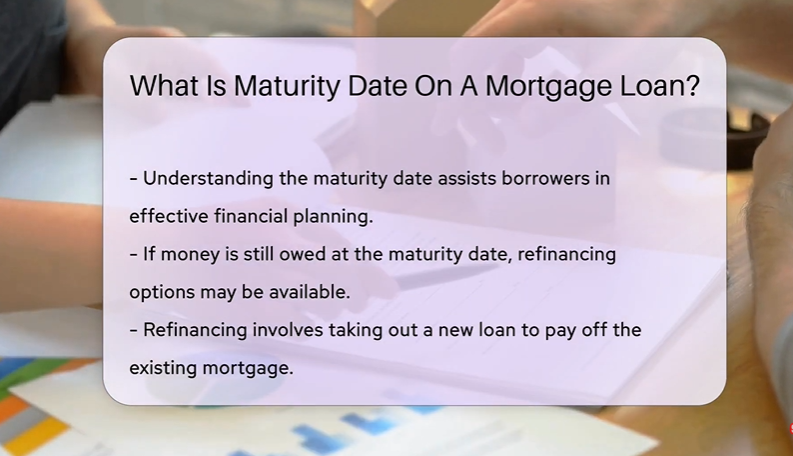A mortgage loan is a significant financial commitment that many individuals undertake when purchasing a home. Understanding the key terms and concepts associated with a mortgage is crucial to making informed decisions. One such term is the maturity date, which plays a vital role in managing your mortgage effectively.
The maturity date on a mortgage loan refers to the date on which the loan must be fully repaid. It marks the end of the loan term and is determined at the time of loan origination. The maturity date is typically mentioned in the mortgage contract, along with other essential details.

Importance of the Maturity Date
The maturity date is essential as it sets a deadline for the borrower to repay the entire loan amount. It serves as a reference point for both the lender and the borrower, ensuring that all parties involved are aware of the repayment timeline.
Having a clear understanding of the maturity date allows you to plan your finances accordingly. You can budget your monthly payments and manage your other financial obligations according to the provided timeline. By being aware of when your loan matures, you can avoid any penalties or late payment fees.
Calculating the Maturity Date
The maturity date is calculated based on two factors: the loan term and the loan origination date. The loan term refers to the agreed-upon length of time within which the loan must be fully repaid. This can range anywhere from 10 to 30 years, depending on the type of mortgage.
The loan origination date, on the other hand, is the date on which the borrower receives the funds from the lender. It marks the official start of the loan agreement. The maturity date is calculated by adding the loan term to the date of loan origination.
For example, if you have a 25-year mortgage with a loan origination date of January 1, 2022, your maturity date would be January 1, 2047.
What Happens at the Maturity Date?
When the maturity date arrives, you will need to repay the remaining balance of your mortgage loan in full. This includes both the principal amount borrowed and any outstanding interest. Most mortgage loans are amortised, meaning you make regular payments that include both principal and interest.
At the maturity date, you have a few options:
- You can choose to pay off the remaining balance in a lump sum. This is known as a balloon payment and is suitable for borrowers who have the necessary funds to repay the loan in full immediately.
- You can refinance the loan. Refinancing involves taking out a new loan to replace the existing mortgage. This option enables you to secure more favourable terms, such as a lower interest rate or a shorter loan term.
- You can negotiate an extension with your lender. If you are unable to make the full repayment, you may be able to renegotiate the terms of your mortgage to extend the maturity date. However, please note that additional interest and fees may be incurred in such cases.

Final Thoughts
Understanding the concept of the maturity date is essential for every mortgage borrower. It helps you plan your finances, avoid penalties, and make informed decisions about the future of your mortgage loan.
Remember to mark your maturity date on your calendar and stay proactive in managing your mortgage. If you have any questions or concerns, it is best to contact your mortgage lender for guidance and clarification.
Frequently Asked Questions: What Is Maturity Date On A Mortgage Loan: Understanding Your Mortgage Timeline
What Is A Maturity Date On A Mortgage Loan?
The maturity date on a mortgage loan is the date when the loan is scheduled to be fully repaid, including both principal and interest.
How Does The Maturity Date Affect My Mortgage Loan?
The maturity date is crucial as it determines the length of time you will have to make payments and the total interest you will pay over the life of the loan.
Can The Maturity Date On A Mortgage Loan Be Extended?
In some cases, it is possible to request an extension on the maturity date of a mortgage loan. However, this is not always guaranteed and will depend on the lender’s terms and conditions.
What Happens If My Mortgage Loan Reaches Its Maturity Date?
When your mortgage loan reaches its maturity date, you will need to fully repay the remaining principal and interest. Failure to do so may result in penalties or legal action by the lender.
Ismail Hossain is the founder of Law Advised. He is an Divorce, Separation, marriage lawyer. Follow him.





Leave a Reply